Traditional Irish music, often simply called “trad,” is a vibrant genre celebrated for its infectious melodies and rhythmic intricacies. While fiddles, flutes, and pipes often take center stage, the guitar plays a crucial, yet sometimes understated, role in bringing this music to life. This article delves into the world of guitar accompaniment in trad Irish music, a genre that offers unique rewards for guitar players seeking new musical horizons.
The heart of trad music lies in its instrumental dance tunes – jigs, reels, slip-jigs, hornpipes, and polkas – each with its own distinct rhythm and character. These tunes, with roots stretching back centuries, present both challenges and incredible learning opportunities for guitarists. My own journey into this genre has been a 20-year exploration, balancing respect for tradition with the desire to find my own voice within it. It’s been a learning curve I wouldn’t trade.
For those curious about exploring traditional Irish guitar music, this guide offers insights and advice to help you navigate this rewarding musical landscape and perhaps avoid some of the initial stumbles along the way.
Pioneers of Traditional Irish Guitar
To truly understand the essence of guitar in Irish music, it’s essential to listen to the masters who have shaped the genre. Here are some influential figures to explore:
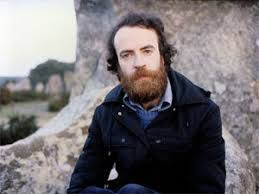 Mícheál Ó Domhnaill playing guitar, bringing a driving rhythm to Irish traditional music.
Mícheál Ó Domhnaill playing guitar, bringing a driving rhythm to Irish traditional music.
Mícheál Ó Domhnaill: A seminal figure from the 1970s with the legendary Bothy Band, Mícheál Ó Domhnaill revolutionized Irish guitar accompaniment. His powerful, driving rhythms and occasional “power chord” voicings injected a new energy into trad music, attracting a younger generation of listeners. Ó Domhnaill’s innovative approach expanded the possibilities of guitar within the genre.
Learn more about Mícheál Ó Domhnaill on Wikipedia >>
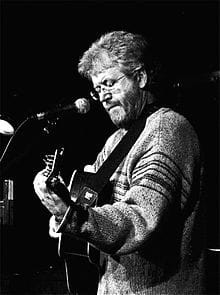 Dáithí Sproule playing DADGAD guitar, a pioneer of this tuning in Irish music.
Dáithí Sproule playing DADGAD guitar, a pioneer of this tuning in Irish music.
Dáithí Sproule: Pronounced “DA-hee,” Dáithí Sproule is a true pioneer, credited with popularizing DADGAD tuning in Irish guitar music. This alternative tuning, with its open and resonant sound, has become a hallmark of many contemporary trad guitarists. Today, Sproule’s masterful accompaniment can be best appreciated with Altan, the renowned Donegal band known for their deep respect for tradition.
Visit Dáithí Sproule’s Website >>
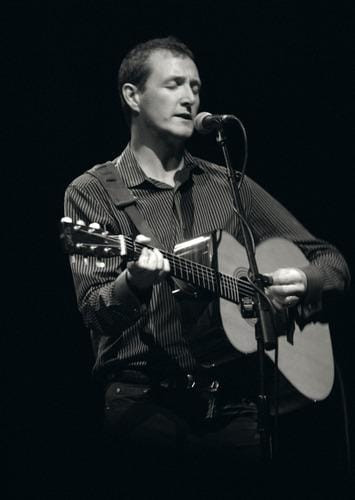 John Doyle playing acoustic guitar with a distinctive and influential style in Irish music.
John Doyle playing acoustic guitar with a distinctive and influential style in Irish music.
John Doyle: Emerging from the band Solas, John Doyle has developed a completely unique and instantly recognizable guitar style. Often imitated but never duplicated, Doyle’s innovative approach to rhythm and harmony has made him one of the most influential guitarists in Irish music today. His playing is characterized by its percussive energy and intricate countermelodies.
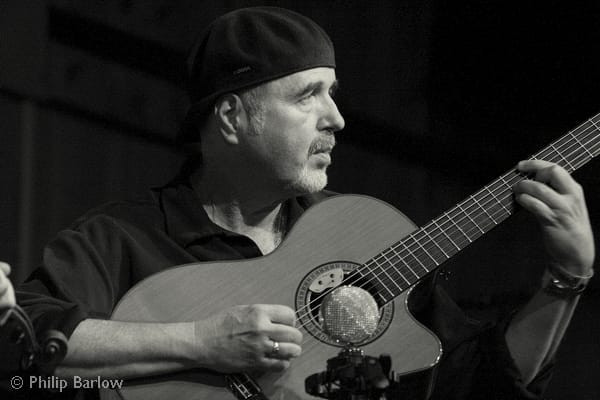 Denis Cahill accompanying Martin Hayes, exemplifying minimalist guitar accompaniment in Irish music.
Denis Cahill accompanying Martin Hayes, exemplifying minimalist guitar accompaniment in Irish music.
Denis Cahill: Best known for his long-time collaboration with fiddle virtuoso Martin Hayes, Denis Cahill embodies the “less-is-more” approach to Irish guitar. His minimalist and beautifully understated playing perfectly complements the melody, allowing it to truly shine. Cahill’s style is a masterclass in supportive accompaniment, prioritizing the tune above all else.
Visit Denis Cahill’s Website >>
The Primacy of Melody in Irish Guitar Music
When approaching Irish trad guitar, it’s crucial to remember that the melody is paramount. Whether you’re playing alongside other musicians or listening to recordings, the tune itself is the heart of the tradition. As a guitarist, your role is to support and enhance the melody, not to overshadow it. Coming from genres where the guitar often takes a leading role, like rock, blues, jazz, or punk, it took me some time to fully embrace this supporting role. Realizing that my primary function was to serve the tune, rather than compete for the spotlight, was a significant shift in perspective.
However, this “servant” role is far from limiting. In fact, it can be incredibly liberating. By focusing on accompaniment, you unlock a different dimension of guitar playing, one that emphasizes rhythm, harmony, and subtle interplay with the melody. This approach opens up vast creative possibilities within a seemingly constrained framework.
Understanding the Forms: Jigs and Reels
A common misconception about trad Irish music is that “it all sounds the same,” often dismissed as repetitive “diddley diddley” music. However, this is akin to saying all blues or jazz sounds the same after only a cursory listen. Just like any genre, Irish traditional music has its own rich vocabulary and forms that reveal themselves upon closer examination.
The Jig
The “diddley diddley” rhythm is likely referring to the jig, a fundamental tune form in 6/8 time. Jigs have a characteristic triple meter feel, often described as having a “lilt.” To get a sense of the jig rhythm, listen to a classic tune like Out On The Ocean. While all jigs share rhythmic similarities, each tune possesses its own unique melodic personality, much like individual people.
The Reel
The other foundational form is the reel, played in 4/4 time and typically characterized by a driving rhythm of eighth notes. The Star of Munster is a well-known example of a standard reel in the trad repertoire. Mastering jigs and reels is the essential starting point for any guitarist venturing into Irish music. From these basic forms, you can delve into the deeper complexities and nuances of the genre.
Resources for Learning Traditional Irish Guitar
For those eager to learn traditional Irish guitar music, numerous resources are available, including excellent instructors specializing in the genre. Here are a couple of notable teachers:
Jimmy Murray: A master of nylon-string guitar in trad music, Jimmy Murray’s playing is defined by his exceptional rhythmic precision and melodic sensitivity. His approach to the guitar is both grounded in tradition and uniquely expressive.
Explore Jimmy Murray’s Guitar Lessons >>
Dave Curley: Dave Curley is a highly regarded DADGAD guitarist known for his dynamic and innovative playing style. His approach blends traditional elements with contemporary techniques, making him a sought-after teacher and performer. A quick online search will easily connect you with both Jimmy and Dave, both of whom I highly recommend.
These resources primarily focus on instrumental Irish tunes. But what about the songs, the “pub songs” that are also strongly associated with Irish music?
The World of Irish Pub Songs
Thinking about Irish songs often brings to mind lively pub sessions and sing-alongs. I’m reminded of my early days playing in Dublin pubs, and a humorous song by my friend Martin Denning, set to the tune of Simon and Garfunkel’s The Boxer:
“I am just a folky and my story seldom told
I have plundered Irish music with a lump of German plywood and a capo
All lies and jest, I have learned the songs with just two chords and disregard the rest.
Li la li li. Li la li li. Li la li”
Irish ballads and pub songs are a significant part of the Irish musical landscape. Many of these songs, like those popularized by The Dubliners in the 1960s and 70s (featuring the iconic Luke Kelly), are considered the Irish equivalent of classic rock. These songs, with their singable melodies and often narrative lyrics, create a participatory and communal atmosphere, perfect for pub settings and gatherings.
While pub songs are often more accessible for audiences to join in, beneath the surface lies a vast and ancient tradition of Irish song, stretching back centuries. This deeper vein of Irish song is a rich area of exploration, though perhaps a topic for another time, given this article’s focus on guitar music.
The Bottom Line for Guitarists
If you’ve never considered exploring Irish traditional music on the guitar, you’re in for a rewarding journey of discovery. A whole world of intricate melodies, rhythmic vitality, and rich musical heritage awaits. Pick up your guitar and dive in – you might just find your new musical passion.
About the Author
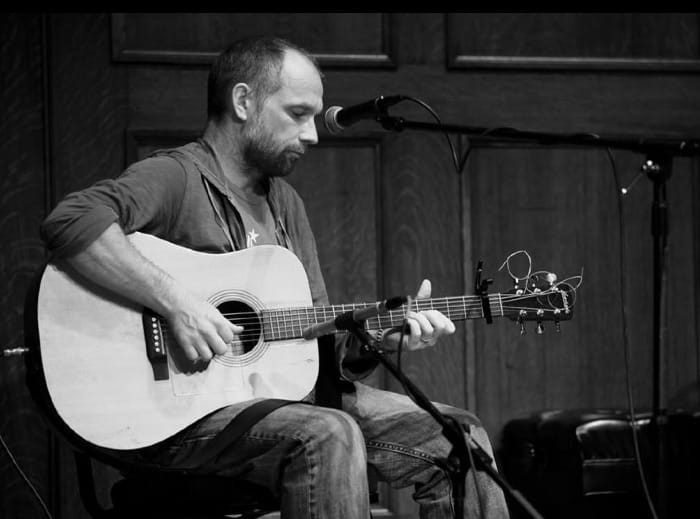 Patsy O'Brien, Irish guitarist and songwriter, hailing from Cork, Ireland.
Patsy O'Brien, Irish guitarist and songwriter, hailing from Cork, Ireland.
Patsy O’Brien, a native of Cork, Ireland, is a globally traveled guitarist, songwriter, and recording artist who has collaborated with many leading figures in Irish music.
An award-winning songwriter and highly sought-after guitarist, Patsy seamlessly blends songwriting and guitar styles. His unique arrangement of “The Star Of The County Down” was featured on NPR’s “All Songs Considered.”
For more information, visit his website at patsyobrienswebsite.com, or connect with him on Facebook and Instagram.
